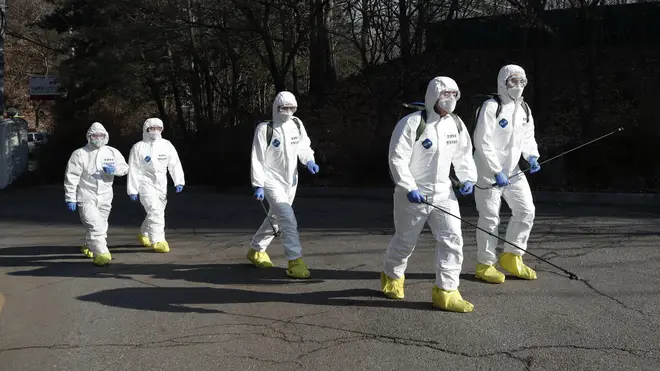
Oli Dugmore 4am - 7am
5 March 2020, 10:36

England's chief medical officer says the UK's response to coronavirus is moving into its second phase. So what will that mean to your life?
Officials are now trying to delay the spread of coronavirus, rather than simply contain it, in the hope of moving the peak of cases away from the winter pressures on the NHS.
The government's plan is in four stages - Containment, Delay, Research and Mitigate. We had been in the Containment phase, but Professor Chris Whitty admitted today that we are now trying to delay the disease until the summer.
So what will the delay phase involve and how will it affect your life? LBC looks at what will happen next.
Phase two of the coronavirus battle plan is to delay the peak of the virus until the summer.
The reason that the government want to delay the spike in diagnoses is to ease the pressure on the NHS, which is always under severe pressure in the winter months.
Viruses are also less contagious during the summer months, so it will not spread as easily by then.
READ MORE: Coronavirus myths busted by experts
READ MORE: Do anti-bacterial hand gels stop coronavirus?
The official Public Health England document on the battle plan states that many of the same things we are currently being told to do continue to be important: washing your hands more regularly, catch coughs and sneezes in tissues and throw them away and avoid touching your face.
However, it also says that other social distancing techniques may be necessary to limit the spread of the virus.
It states: "Our experts are considering what other actions will be most effective in slowing the spread of the virus in the UK, as more information about it emerges.
"Some of these will have social costs where the benefit of doing them to Delay the peak will need to be considered against the social impact."
The options the government are considering include:
- Encouraging employees to work from home where possible
- Closing schools to stop the spread of the virus
- Stopping large gatherings of people, such as sporting events and conferences
The government say that at present, they will not be advising schools to close.
So far, a limited number of schools have closed across the country when parents of pupils have tested positive for covid-19.
So far there have been around 15 closures because of the virus - some of the confirmed cases are:
Dublin - A secondary school has been closed for 14 days following a student’s return from an infected area in Italy. He’s being monitored in Dublin’s hospital with infection-control measures.
Tetbury, Gloucestershire - Closed for three days after a staff member tested positive.
Cransley School in Northwich, Cheshire - School closed for the a few days following a ski trip to Italy.
Trinity Catholic College in Middlesbrough - Pupils infected here were also the result of an Italy ski trip.
Churston Ferrers Grammar School in Brixham, Devon - Reports suggest they've closed over a suspected coronavirus case.
Both Japan and Italy have closed schools for two weeks to attempt to delay the spread of the virus.
While children rarely show any symptoms from coronavirus, they can act as spreaders and that can lead to infections of adults.
In China, cities were placed in lockdown, with people being unable to enter or leave. Some reports even suggested that people were welded into their homes.
Italy has also locked down some infected cities in the Lombardy region. A number of high-profile sporting events have been cancelled - including two of Italy's Six Nations rugby matches. Serie A football matches will be played behind closed doors.